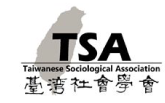場次簡介/ Description:
人工智慧(簡稱AI)已經漸漸主導我們日常生活中大大小小的決策與行動。從進出停車場時的車牌辨識,到影音平台上頻道的選擇,到銀行貸款時的決策、醫療上的診斷,甚至到藝術上的創作,AI的機器學習演算法幾乎無役不與、無所不在。相較之下,學術領域特別是社會科學,將機器學習的方法應用在研究分析上,起步相對晚了一些。其中一個原因,可能來自於社會科學傳統上重視解釋(或詮釋)多於預測,而這剛好也正是機器學習方法相對的強項(預測準度)與弱項(解釋難度),也因此還未在社會科學方法論上引發全面性的革命。
本場次試圖打破這個窠臼,藉由三篇由社會學和相關領域學者主導的發表,我們將展示機器學習方法如何幫助我們深化社會科學研究的品質,增強我們的研究在實務議題上的應用潛力。三篇論文的主題各異其趣,第一篇論文是由中央研究院社會學研究所李宣緯助研究員發表,將示範如何將機器學習的方法應用在合作賽局的電腦模擬上。具體而言,機器學習方法將幫助賽局中的決策個體擬合出更有利社群利益的合作策略。第二篇論文是由刑事警察局張伊君副大隊長(同時也是台灣大學資訊管理博士)發表,她將示範如何引入網絡深度學習方法,來預測並解釋台灣海上犯罪者的協作網絡關係。第三篇論文,是由中央研究院社會學研究江彥生研究員發表,透過改編一個資工學者開發的深度學習模型,他將用這個模型來解析國際排球賽事上每一個國家代表隊的球風與策略。
評論人/ Discussant:張伊君(刑事警察局/台灣大學資訊管理博士)
發表人/ Presenter:
Szu-Ping Chen (Department of Agronomy, National Taiwan University)
Hsuan-Wei Lee (Institute of Sociology, Academia Sinica)
題目/ Title:Achieving widespread cooperation through reinforcement learning in adaptive social networks
摘要/ Abstract:
The emergence of group cooperation in diverse social systems is extensively studied within the context of evolutionary games. The most prevalent method for altering behavior is imitating entities with superior performance. In the era of artificial intelligence, however, the efficacy of reinforcement learning in a variety of disciplines has been extensively demonstrated. In this study, reinforcement learning is integrated into traditional evolutionary games across various social network categories. Instead of imitating the strategies of others, agents now use reinforcement learning to maximize their payoff. Alternatively, they employ sophisticated self learning strategies. Using the reinforcement learning model, agents can also determine whether or not to modify their companions. In our simulations, cooperation is enhanced in an environment of adaptive networks. Under particular parameter settings, rewiring can reduce the number of defective agents and increase the proportion of cooperative agents with stable edges. Unsatisfactory revisions to the strategy led to unstable margins and a decline in cooperation. Lastly, we investigate the effects of strategy update rates combined with different rewiring rates and identify the optimal cooperation region.
Keywords: Social dilemma, evolutionary games, reinforcement learning, adaptive social networks
發表人/ Presenter:張伊君
題目/Title:應用社會網絡分析與機器學習建立臺灣走私犯罪風險評估模型
摘要/Abstract:
臺灣四面環海,最常見的走私模式就是透過漁船進行海上走私,目前臺灣查獲海上走私犯罪的情資來源主要都是透過線報,一般檢查查獲的走私犯罪案件數量非常少,若能提供安檢人員更多有關風險評估的資訊,可增加海巡機關針對船舶風險管理的效率,因此本研究提出「海上走私風險評估模型(Maritime Trafficking Risk Assessment, MTRA)」,由過去的海上活動行為預測未來可能會有走私犯罪風險的人員,另外使用圖神經網絡(Graph Neural Network, GNN)方法進行風險偵測,並比較圖形資料中不同關係權重對於分析結果的影響,找出適合的風險評估方式。
本研究在MTRA模型中加入風險因子與SNA因子,經實驗結果顯示加入兩種因子都能提升模型準確率,尤其SNA因子能讓模型整體準確率上升20%以上,整體而言本研究MTRA模型能發現60%的高風險者,且本研究採取學術單位與實務界一起共同合作模式,研究成果可提供執法機關未來進行漁船風險管理系統參考。
關鍵字:海上走私犯罪、風險管理、社會網絡分析、梯度提升決策樹、圖神經網絡分析
發表人/ Presenter:
江彥生(中央研究院社會學研究所)
陳毓君(國立台灣體育運動大學)
題目/Title: Finding a winning formula for volleyball game through a deep learning model
摘要/Abstract:
Team sports involve the coordination of athletes at different positions to perform simultaneously or sequentially in sport game. Understanding the social dynamics in team sports is not only a theoretical question in social psychology; it is also a core endeavor in sports science that aims to formulate tactics for winning sports games. We adapt a deep learning model and apply it to video footages of a recent international volleyball tournament to unpack the determinants of winning the tournament. The model attains an impressive performance in accuracy. Importantly, we apply a feature importance estimation method to assess the contribution of each element to winning the game. We find that, out of surprise, the sequence of ball movements plays a more important role than the spatial position of handling the ball in determining the results of the game. Our model can be further used to test different tactics that otherwise would be costly to implement in real play. It can also be applied to other team competition, not only limited to sports, that shares a similar structure to volleyball game.
Keywords: volleyball game, deep learning, group dynamics,


